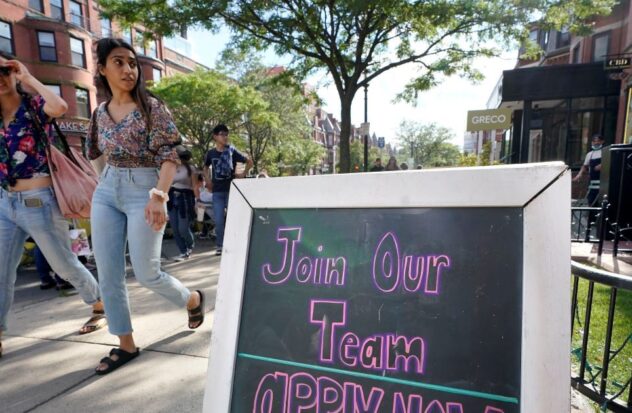In recent years, after the COVID-19 pandemic, robberies and deceptions against elderly people have worsened. Nor are young people and other adults in need of services, loans, legal help, obtaining documents and, above all, a good job that is sufficient to cover the current high cost of living in the United States, not exempt, after more than three years of the worst inflation in almost five decades.
Less than 20 years ago, the applicant for a job position applied in person and in the same place, then they were called or not to an interview, and at the time or days later they received the response by mail or by telephone. Those times of certainty now seem to have definitively ended, with few exceptions.
Today this has become big business and an important source of scams, among other things, by agencies, companies and entities and organizations that receive government funds.
The big business
Tens of thousands of companies have gotten into the business over the past three years, getting grants from state and federal governments to supposedly help people find jobs. And they do, but in most cases they exaggerate the figures for assistance and services to maintain or increase their dividends at the expense of taxpayers’ money.
Almost half of the job offers on the internet (online) in the US are false.
Why is this happening?
The current crisis of fake vacancies requires that government entities increase the control and supervision about what these agencies really do that call hundreds of people to give the image of a careful service to the unemployed, they promise that they will call them and only a third of the applicants end up with a job.
Other companies do it to give an image of unreal economic growth and keep employees on staff with hopes of improvement. In this way they also avoid the massive departure of workers to other competing sectors.
In 2022 in the US the number of job vacancies reached 11.9 million, the highest record in the history of the country. This increased, among other causes, the exodus of employees in search of better salary and benefits offers, a phenomenon that business owners try to avoid at all costs; hence the salary increases seen in recent years in different sectors of the economy.
In addition to the above, ghost companies emerge that collect state and federal subsidies for a time until they are denounced and taken to court for federal fraud. They are the ones that fall into the hands of Justice the fastest, with the exception of those who manage to evade the law, sometimes for several years.
The business of defrauding vacant positions now operates in the midst of brutal competition and with some similarities to the theft from Medicare and Medicaid by unscrupulous owners of health clinics, therapeutic centers and different services in the sector.
The alarms
At this time, the issue is of such magnitude that it has attracted the attention of federal regulatory and consumer protection agencies.
Recruiting professionals and victims of “ghost posting” say the practice hurts everyone, including the companies that create it.
According to research, companies use fake online job postings to project an image of growth, keep existing employees motivated, and cultivate a pool of potential future candidates with no intent to hire. It also favors the attractiveness of investors who in turn give it greater stock market value when buying shares.
The modality of Deception represents 43% of offers online work in multiple industries.
Clarify Capital research conducted with more than 1,000 hiring managers, one-third of professionals said they used ghost posts to appease overworked employees due to reduced labor costs.
On average, a job seeker can take up to eight weeks to receive an offerafter submitting an online application, according to the job site Indeed.
The process often includes resume tailoring, extensive applications, and multiple rounds of interviews, meaning applicants waste dozens of hours trying to get hired by companies that aren’t actually looking for anyone.
The frustration
This new form of scam has generated enormous frustration among millions of Americans who are looking for jobs or trying to improve their living status. Nobody gives them an explanation and they remain in limbo until luck is with them or a friend recommends them directly and personally to a company interested in hiring.
55% of Americans say they are “completely exhausted and disappointed” by their job search, a report from staffing firm Insight Global reveals.
Also, most recruiting professionals say that ghost posts They hurt companies that are truly looking for new talent.
Many recruiting professionals believe that ghost posting hurts companies that are actually looking for new talent.
“Fake job postings hurt companies that are legitimately trying to hire people,” Ben Lamarche, general manager of Lock Search Group, told The Epoch Times.
“These job boards not only overcrowd and make it difficult for candidates to find and apply for genuine job openings, but they also cause frustration and mistrust among candidates.”
Lamarche has witnessed the rise of fake jobs. A former recruiter friend of his confessed to posting “ghost jobs” to impress clients and improve his performance metrics. Lamarche noticed that the recruiter didn’t seem concerned about the quality or interest level of the candidates, just looking for contact information.
Deceived applicants
Technology companies, recruiters and staffing agencies are among the biggest promoters of fake job postings, says Stephen Greet, CEO of BeamJobs.
“With how quickly the industry is moving, it is key to maintain a pool of potential candidates ready to go. That way, if a new project comes up or someone leaves, they have qualified people available,” Greet says.
The victims, for their part, demand that This type of competitive cheating must be sanctioned with severity by law; It would be the only way to exterminate these fraudulent practices or at least reduce them to a minimum for the benefit of the American labor market and the confidence of those who want and need to work.
The other method used by hiring managers is that they maintain for many months after the publication of the vacancy that has already been filled, explains Conor Hughes, human resources consultant.
The goal is “simply to give the appearance that these companies are continually hiring and growing.”
Hughes warns that fake job listings are not limited to large job search websites, but also to medium and small businesses, which keep the same job offers posted for almost a year with no plans to interview anyone.
Although according to the Biden administration unemployment is below 4%, it is becoming increasingly difficult to find a real job on the internet and obtain the desired job position despite meeting all the requirements, when more than 90 % of companies today require that applications and search be only online.
Hundreds of thousands of people are trapped every year at this enormous crossroads and indefinite wait, with no effective actions of federal authorities regarding the fraud of false vacancies.
(email protected)



